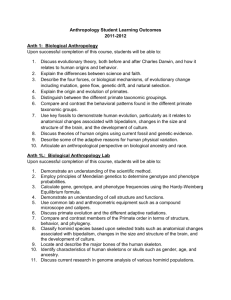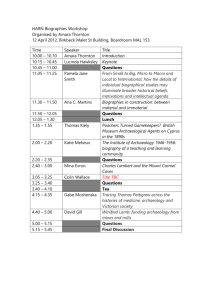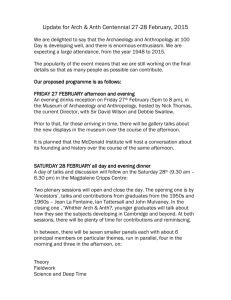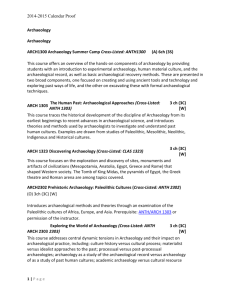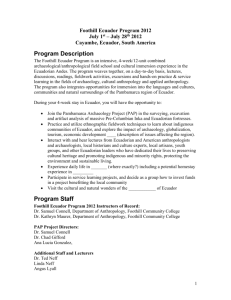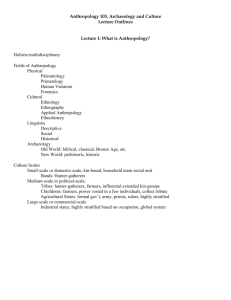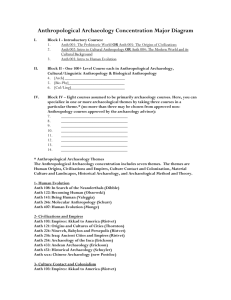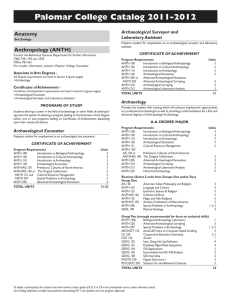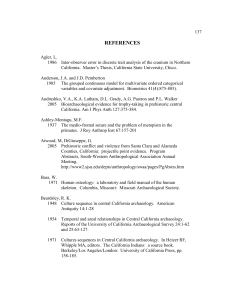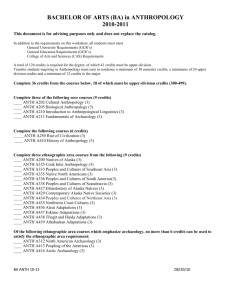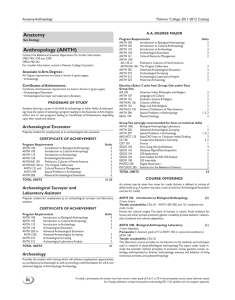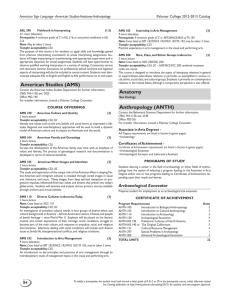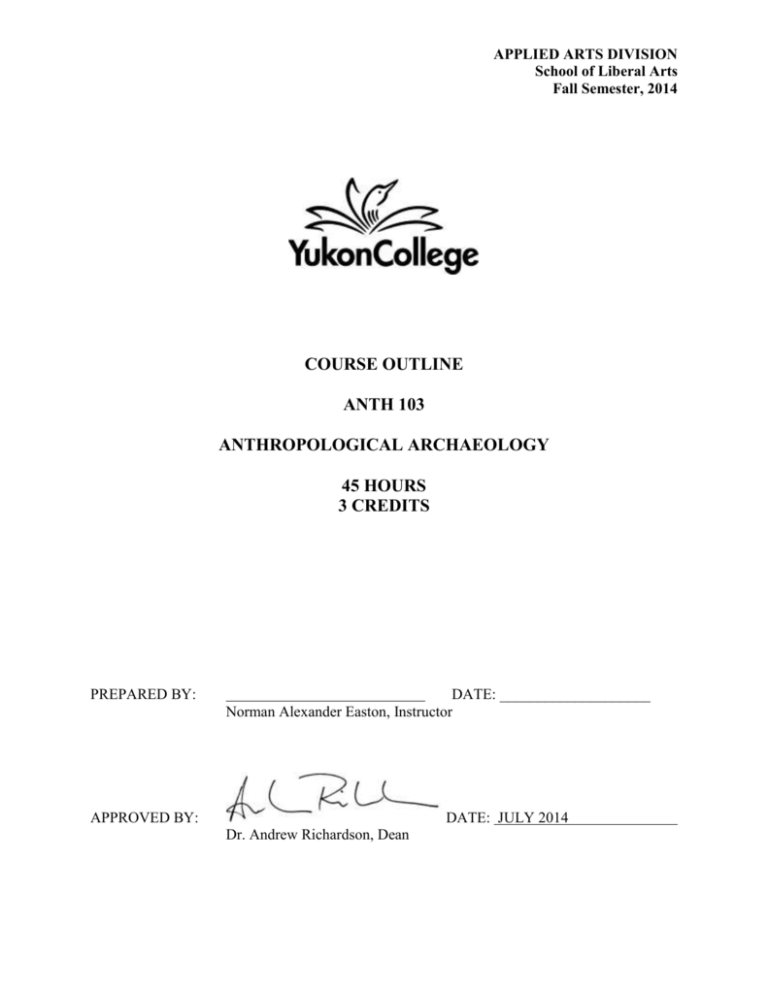
APPLIED ARTS DIVISION
School of Liberal Arts
Fall Semester, 2014
COURSE OUTLINE
ANTH 103
ANTHROPOLOGICAL ARCHAEOLOGY
45 HOURS
3 CREDITS
PREPARED BY:
DATE: ____________________
Norman Alexander Easton, Instructor
APPROVED BY:
DATE: JULY 2014
Dr. Andrew Richardson, Dean
YUKON COLLEGE
Copyright July, 2014
All right reserved. No part of this material covered by this copyright may be reproduced
or utilized in any form or by any means, electronic or mechanical, traded, or rented or
resold, without written permission from Yukon College.
Course Outline prepared by Norman Alexander Easton, July 2014.
Yukon College
P.O. Box 2799
Whitehorse, YT
Y1A 5K4
APPLIED ARTS DIVISION
Anthropological Archaeology
3 Credit Course
Fall Semester, 2014
ANTHROPOLOGICAL ARCHAEOLOGY
INSTRUCTOR: Norman Alexander Easton, MA OFFICE HOURS: after class
OFFICE LOCATION: A2410
CLASSROOM: Lecture – A2204/Lab A2801
E-MAIL: northeaston@gmail.com
TIME: Lecture 9:00-10:30am/Lab 10:30-12
TELEPHONE: Office: 668-8770; Hm: 393-8012 DATES: Lecture Tues/Thurs/Lab Thurs
COURSE DESCRIPTION
This course provides a general introduction to the field of Archeology as a sub-discipline of
Anthropology. The concepts, theories and methods of the discipline will be examined, and
their application to the study of human pre-history will be discussed. Students will develop
an appreciation of how archaeology contributes to the understanding of the history of human
societies and basic archaeological laboratory skills.
PREREQUISITES
None
COURSE TRANSFER
UBC ANTH 103 (3)
SFU ARCH 201 (3) – B- Soc
UVIC ANTH 100 lvl (1.5)
UNBC ANTH 100L (3) Anth 101 & Anth 103 =
UNBC ANTH 100 (3) & Anth (3) 100 level
UAF
UAS
UR
TRU
TWU
ANTH 211 (3)
ANTH 211 (3)
ANTH 201 (3)
ANTH 1190 (3)
ANTH 100 Lvl (3)
LEARNING OUTCOMES
Upon successful completion of the course, students will:
Gain an understanding of the basic theories and methods of field archaeology, including
survey and excavation, measurement and sampling, stratigraphy and dating, and record
keeping;
Have a basic understanding of the models developed in archaeology that may be
applied to interpreting the meaning of spatial patterns within and between
archaeological sites;
Develope practical skills in archaeological laboratory work, including metric and
wear analysis, and floral, faunal, and sediment analysis;
Gain practical skills in the presentation of archaeological data through tables, graphs,
statistical summaries, photographs, drawings, and textual descriptions;
Understand the ethical and legal context of the practice of archaeology in Canada
and, in particular, the Yukon Terrritory.
COURSE FORMAT
Classes will consist of lectures and in-class discussions of current readings, supplemented
by several field trips and a weekly laboratory demonstration and assignment.
COURSE REQUIREMENTS/EVALUATION:
Evaluation:
Grades for ANTH 103 will be assigned based on the percentile equivalent of student
achievement in the following:
Attendance/Participation
Labs
Term Project Work
Term Project Report
Final Exam
30
50
100
20
100
Total Marks
300
Up to 30 marks will be awarded for regular attendance and informed participation in class
discussions of the current topic.
Lab Exercises
A series of five lab exercises will be assigned throughout the course. These exercises will
prepare students to undertake their term project work which will involve them in the
primary analysis of archaeological materials collected from the Little John site. Total value
of the labs will be 50 marks.
Term Project
A term project, which will involve working directly with archaeological material and
preparing a report on activities, will be assigned in consultation with the instructor.
Completion of this project will be worth up to 120 marks: 100 marks for project work
completion and accuracy, 20 marks for a report on the project.
Final Examination
A comprehensive final examination will be written during the designated examination
period. It will be worth up to 100 marks.
REQUIRED TEXTBOOKS/MATERIALS
Kelly, R. L., & Thomas, D. H. (2013). Archaeology (6th ed.). Belmont, CA:
Wadsworth/Cengage Learning.
Additional supplementary readings on recent discoveries and issues may also be assigned.
PLAGIARISM
Plagiarism is a serious academic offence. Plagiarism occurs when students present the
words of someone else as their own. Plagiarism can be the deliberate use of a whole piece
of another person’s writing, but more frequently it occurs when students fail to
acknowledge and document sources from which they have taken material. Whenever the
words, research or ideas of others are directly quoted or paraphrased, they must be
documented according to an accepted manuscript style (e.g., APA, CSE, MLA, etc.).
Resubmitting a paper which has previously received credit is also considered plagiarism.
Students who plagiarize material for assignments will receive a mark of zero (F) on the
assignment and may fail the course. Plagiarism may also result in dismissal from a
program of study or the College.
ACADEMIC ACCOMODATION
Reasonable accommodations are available for students requiring an academic
accommodation to fully participate in this class. These accommodations are available
for students with a documented disability, chronic condition or any other grounds
specified in section 8.0 of the Yukon College Academic Regulations (available on the
Yukon College website). It is the student’s responsibility to seek these
accommodations. If a student requires an academic accommodation, he/she should
contact the Learning Assistance Centre (LAC) at (867) 668-8785 or
lassist@yukoncollege.yk.ca.
WRITING CENTRE
All students are encouraged to make the Writing Centre a regular part of the writing
process for coursework. Located in C2231 (adjacent the College Library), the Writing
Centre offers half-hour writing coaching sessions to students of all writing abilities.
Coaching sessions are available in person and through distance technologies (e.g., email
plus Skype or phone). For further information or to book an appointment, visit the Centre's
website: www.yukoncollege.yk.ca/student_info/pages/writing_centre.
ACADEMIC CALENDAR COURSE DESCRIPTION
The concepts, theories, and methods of archaeology are examined. Students develop an
appreciation of how archaeology contributes to the understanding of the development of
human societies. Students must also register in ANTH 103L, the mandatory lab
component of this course.
ANTHROPOLOGY 103- INTRODUCTION TO ANTHROPOLOGICAL
ARCHAEOLOGY
CLASS SYLLABUS
N. A. Easton, Instructor (Fall 2014)
Seminar Classes: Tues/Thurs 10:30 – Noon
Week
Labs: Thursday 10:30 - Noon
Topic
Readings
Week 1
Introduction to Archaeology
Ch 1 & 15
Week 2
The Structure of the Archaeological Record
Ch 2
Week 3
Fieldwork Survey Method and Excavation Strategies Ch 3 & 4
Week 4
Geoarchaeology and Site Formation Processes
Ch 5
Week 5
Chronology Building – Sequences and Dating
Ch 6
Week 6
Time, Space, Form Constructs / Culture Histories
Ch 7
Week 7
Taphonomy, Experimental, and Ethnoarchaeology
Ch 8
Week 8
Bioarchaeology – People, Animals, Plants
Ch 9 & 10
Week 9
Social and Political Systems of the Past
Ch 11
Week 10
Cognitive Archaeology
Ch 12
Week 11
Key Transitions in World Prehistory
Ch 13
Week 12
Historical Archaeology and the Future
Ch 14 & 16
Week 13
Student Project Presentations / Course Review
LAB EXERCISES
These exercises will prepare students to undertake their term project work which will
involve them in the primary analysis of archaeological materials collected from the Little
John site.
1. Lithic Identification and Analysis
2. Faunal Identification and Analysis
3. Sediment Sampling and Description
4. Stratigraphic Profiles
5. Distributional Analysis
Bonus Term Work: Lithic Casting – up to 25 bonus marks for preparation of artifact casts.




